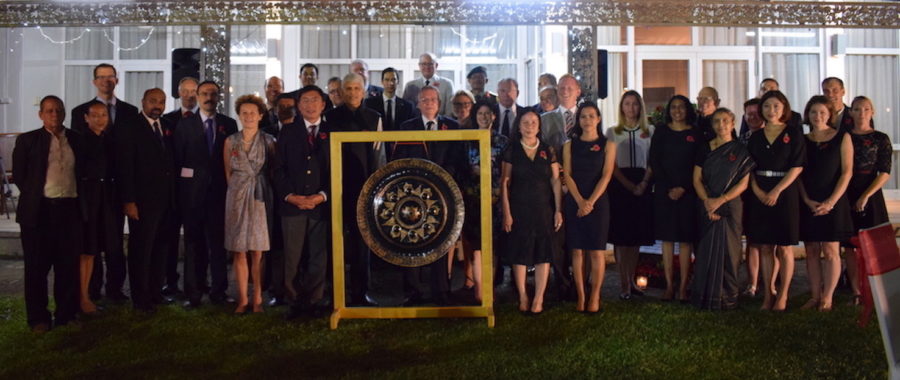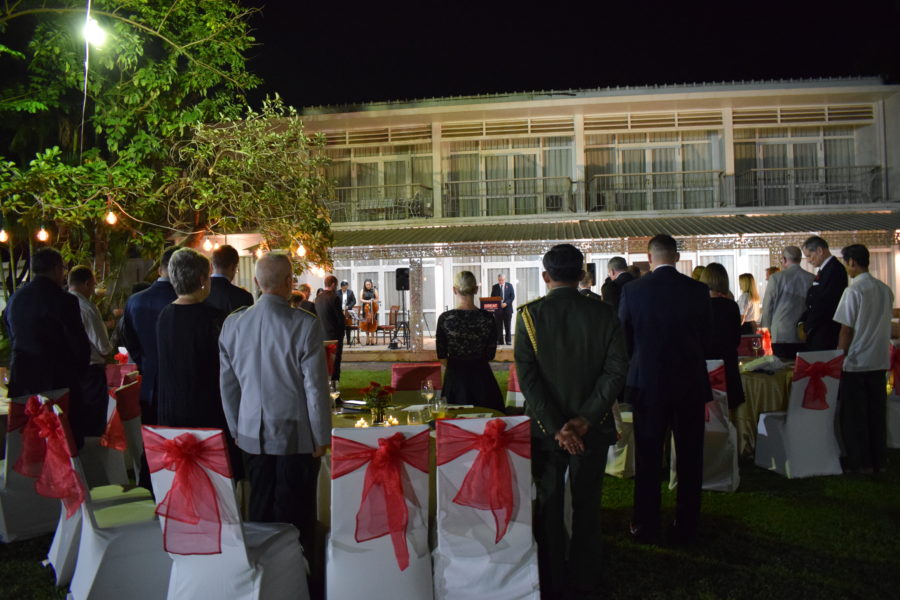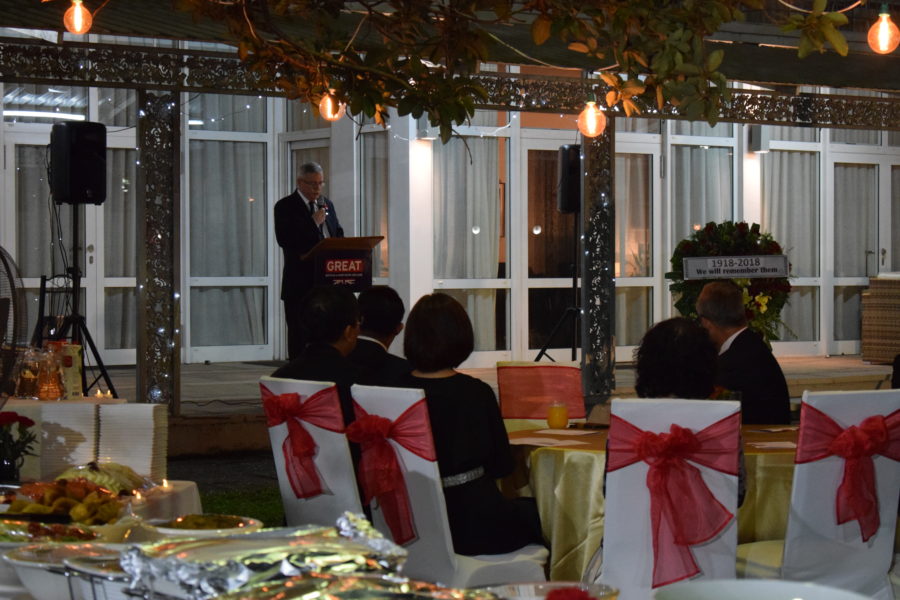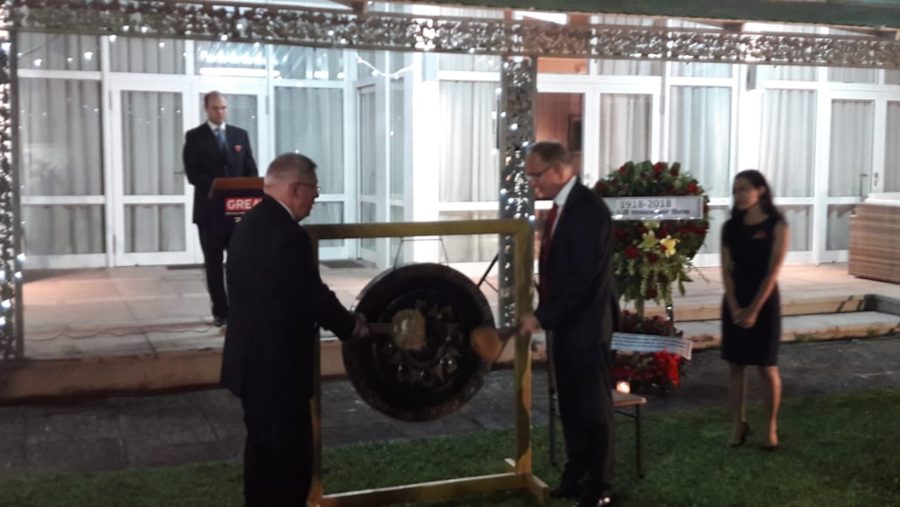14th November 2018 Vientiane, Laos
Remembrance Day 2018 – Marking the Centenary in Laos

Fellow Commonwealth and non-Commonwealth Ambassadors, members of the diplomatic corps, proud veterans, ladies and gentleman.
A warm welcome to the third Commonwealth Remembrance Ceremony in Laos which I am honoured to host at my Residence, to be followed by our traditional Indian curry meal on such an occasion. This really is a great Commonwealth tradition!

Though the Commonwealth Remembrance Ceremony honours all who made the ultimate sacrifice in the Second World War and in subsequent conflicts from Korea to Afghanistan, it was originally established to commemorate those who perished in the First World War.
And today is a very important anniversary. A hundred years ago the Armistice was declared which brought an end to what – with a misplaced sense of hope – was called “the war to end all wars”. On the 11th hour of the 11th day of the 11th month, the guns fell silent across Europe.
In a gesture of reconciliation, the British and German governments have agreed a special bell-ringing event to mark the Centenary to be observed by all our Missions globally. Adapting to our local cultural context, the bell has been replaced by a gong that all national representatives here will be invited to strike to symbolize our re-dedication to the cause of peace.
Against this background, I feel especially privileged to be making opening remarks this year. And, in my last year as British Ambassador in Laos, I’d like to say something about what Remembrance means to me personally.
To my mind, nothing sums up the spirit and purpose of this gathering more than the famous epitaph penned by John Maxwell Edmonds. It is inscribed on a memorial to the Indian and other Commonwealth troops killed at the Battle of Kohima in 1944, a turning point in the Second World War: “When you go home today, tell them of us and say, for your tomorrow, we gave our today”.
It’s why I believe Remembrance is about three words that begin with R.
The first most obviously is the R for Remembrance itself. We remember the 1.2 million Commonwealth soldiers who died in the First World War and the 2 million wounded, as well as the many more casualties of subsequent wars.
But of course it was not just Commonwealth armies that bore the brunt of conflict. Our allies and former enemies, represented here, suffered huge losses, too, sacrifices we commemorated in a beautiful and moving ceremony organised earlier today by the French Ambassador and her colleagues.
I feel proud and humbled to have been invited to read out a joint statement partly in English, complimenting the words spoken by my French and German counterparts in their own languages. It was an act of solidarity as well as Remembrance.

But reading those words also reminded me that behind every statistic of death was a living, breathing human being whose passing was a tragedy for those who loved and cared for them.
In his most famous poem, WW1 Canadian Doctor, Lt-Col. John McRae, exclaimed “We are the Dead, Short days ago, We lived, felt dawn, saw sunset glow, Loved and were loved, And now we lie in Flanders Field.”
Sometimes the stories of bereavement are unbearably poignant. Later in this service we’ll hear a reading of one of Wilfred Owen’s most famous World War One poems. Owen, a Lt. in the Second Manchester Regiment, was killed in France just a week before the end of the war.
Like so many other families, Owen’s mother was notified of her son’s death by telegram. But in her case she was handed the message on the morning of the 11th of November just as the church bells were ringing out to proclaim the Armistice. Bells that we will symbolically recreate today.
For our tomorrow, they gave their today. The Commonwealth and Allied soldiers gave their today fighting for their countries and their freedom. But I believe they also died fighting to make the world a better place, where old divisions would be healed, not perpetuated, and former enemies would become firm friends.
It’s why the second R we should evoke is the R for Reconciliation. It’s a concept that dates back to the First World War itself.
In the war’s early stages, Edith Cavell was a British nurse in Belgium who saved many soldiers on both sides of the conflict but who was later executed by the Germans for helping Allied prisoners to escape. Before she died, she insisted that “Patriotism is not enough. I must have no hatred or bitterness towards anyone”. It was a remarkably brave, magnanimous and far-sighted sentiment for someone about to face a firing squad.
But there’s no point pretending that Reconciliation after the dislocation of war is always a smooth process for ordinary people.
Truth be told, my own parents, who lived through World War Two, were never entirely comfortable with forgiving former enemies. The emotions simply ran too deep. And I respected them for their honesty.
But, from the time I was a child, they also made it clear to me that we should never live in the past. That it was only by looking forward, and not backwards, that the world would succeed. And I loved them for their optimism.
And surely they were right. Despite its many challenges, the world since 1945 has enjoyed unparalleled peace and prosperity. We are all its beneficiaries and Reconciliation, however hard, has been its cornerstone. It’s why I am personally touched to be doing this joint striking of the peace gong tonight with Jens, my friend as well as my diplomatic colleague.

To me, though, Reconciliation is more than just being friends with past adversaries. It’s also about a willingness to learn from them and from each other. And so the last R we should practice is the R for Reflection.
I have read many powerful accounts of the world wars by British, Commonwealth and Allied writers. They have left a deep impression, not least in reminding me that I am lucky to be part of a generation that was born after these terrible events.
But I was also profoundly affected by the work of a German writer, Erich Maria Remarque. All Quiet On the Western Front is his semi-autobiographical World War One novel that documents so vividly the horror of what life was like in the trenches. It also offers a stern warning about the dangers of unrestrained nationalism. It was a message rejected in Remarque’s own time – indeed, his works were among the first to be burnt by the Nazis after they came to power. But it’s a message which, I would argue, remains relevant to us today.
When I first read the book, I was about the same age as the writer and his friends when they trooped off to war so joyfully, only to have their lives either cruelly shortened or, for those who survived like Remarque, traumatised. It made me realise what the soldiers on my side must have gone through, too.
They were young people who had hopes and dreams just like me but who, in many cases, never got to fulfil them. They loved and were loved and now they lie in Flanders Field – and in countless other cemeteries around the world, including in Laos.
“When you go home today, tell them of us and say, for your tomorrow, we gave our today”. When I go home today, I’ll reflect again, as I have done after every Remembrance service, on how lucky I am to be part of a generation that, for the most part, has never had to repeat the sacrifices of those earlier generations who helped to secure our future.
Because of their sacrifices, I’ve been able to have the education I needed.
Because of their sacrifices, I’ve been able to pursue the career I wanted.
Because of their sacrifices, I’ve been able to lead the life I chose.
For my tomorrow, they gave their today. And all I can say is thank you. For all our tomorrows, I would like to invite you all now to observe a two minute silence for the Fallen. Lest we forget.